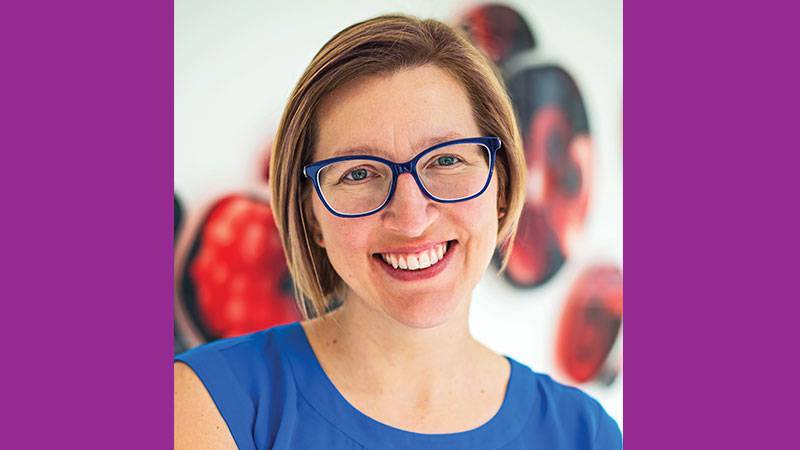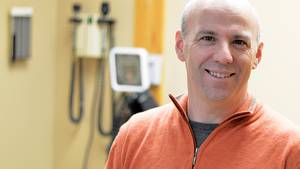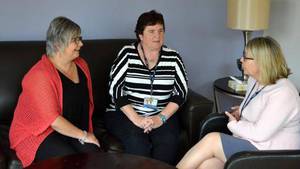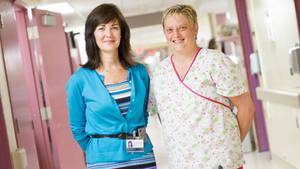Every year, more than 13,400 Atlantic Canadians are diagnosed with cancer — with Nova Scotia experiencing some of the highest cancer incidence and mortality rates in Canada.
With that in mind, the QEII Health Sciences Centre and Dalhousie Faculty of Medicine have identified cancer research as a major target in their strategic plans.
In 2020, Dr. Robin Urquhart, a QEII affiliate scientist and associate professor in the Dalhousie Faculty of Medicine’s Department of Community Health and Epidemiology, was appointed the Canadian Cancer Society Nova Scotia Division Endowed Chair in Population Cancer Research, funded by the QEII Foundation. The position comes with a five-year renewable term.
While continuing the work of the previous chairholder, Dr. Urquhart is also expanding the scope of her previous research. Her work includes everything from access to care for those in underserved, underrepresented communities to lifestyle and environmental risk factors.
“I’m always asking myself, ‘How do I make sure my research is really focused on what’s important to patients and their families?’” says Dr. Urquhart. “I want my research to be relevant.”
Dr. Urquhart’s quest to conduct relevant cancer research took root in her youth. When she was 11, her father died of pancreatic cancer at age 38. To receive treatment, he had to drive seven hours from their home in rural Newfoundland to the hospital in St. John’s. Three and a half years later, her mother died of the same kind of cancer at age 35.
Those formative events propelled her to earn a PhD in implementation science, which is the study of how evidence-based practices become routinely used in health care. Since graduating from Dalhousie, she has devoted her career to studying the entire cancer continuum, from primary prevention to survivorship and end-of-life care.
In 2021, Dr. Urquhart was named the scientific director of the Atlantic Partnership for Tomorrow’s Health Study (PATH), which is part of CanPath, Canada’s largest population health study and a national platform for health research.
“We need to make sure researchers across the region are aware of the data and biosamples held by Atlantic PATH and are utilizing this resource,” says Dr. Urquhart. “If we can link all of our lifestyle, genomics and environmental data with the broader health datasets available in our region, it would give Atlantic Canadian researchers a scientific platform that is unprecedented in Canada.”
The goal of genetics-based research is to improve diagnoses and develop more personalized treatments with fewer side effects that offer a longer-life prognosis with good quality of life.
Since taking on the Chair position, Dr. Urquhart has also turned her attention to environmental links to incidences of cancer. As a teenager, she was aware that the community where her family lived housed a power plant that had been built in the 1970s and was likely leaking toxic chemicals. She is now working on research with others to examine the high pockets of lung cancer in Nova Scotia where there are also high levels of radon, a naturally occurring gas produced by the decay of uranium found in most rocks and soils in the province.
“We can study certain people with multiple risk factors, such as whether they’re smokers and they have been exposed to radon,” says Dr. Urquhart. “Then the big push is to put lung-cancer screening programs in place for those high-risk populations in our context.”
Dr. Urquhart’s primary focus is improving cancer prevention, diagnosis and treatment. She is also dedicated to helping cancer survivors manage their needs post-treatment.
“Patients struggle figuring out how to cope and manage after they’re declared cancer-free,” she says. “They have many ongoing side effects from treatment that leave them with anxiety and they may not have contact with their healthcare providers until their next checkup.”
In addition to anxiety, cancer survivors can deal with chronic pain, nerve problems, concentration and memory problems, and sexual function and intimacy issues. For the most part, these are invisible to other people. They go back to work and a so-called “normal” life, and everyone thinks they are all better.
“No one sees the problems with vaginal dryness or erectile dysfunction,” says Dr. Urquhart. “A big part of my work is to do better in personalizing follow-up care. It doesn’t have to be with an oncologist; it can be with another specialist, such as a nurse practitioner or a gynecologist.”
The Canadian Cancer Society Nova Scotia Division Endowed Chair in Population Cancer Research position gives Dr. Urquhart the leverage to be able to do such valuable research.
“We have such a high burden of cancer in Nova Scotia, but we have excellent cancer researchers and opportunities to build our cancer-research landscape and connect it to practice. Data saves lives — we need research if we’re going to tackle these challenges.”








